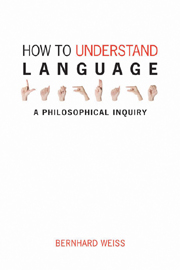Book contents
- Frontmatter
- Contents
- Preface
- 1 The puzzles of language
- 2 The starting-point for analysis
- 3 Analysing sentence-meaning
- 4 Analysing synonymy
- 5 Radical translation
- 6 The structure of a theory of meaning
- 7 Radical interpretation
- 8 Linguistic norms, communication and radical interpretation
- 9 Linguistic normativity
- 10 Radical or robust?
- 11 Language and community
- 12 Rules and privacy: the problem
- 13 Rules and privacy: the solution?
- 14 Truth-conditions versus use-conditions
- Notes
- Bibliography
- Index
8 - Linguistic norms, communication and radical interpretation
- Frontmatter
- Contents
- Preface
- 1 The puzzles of language
- 2 The starting-point for analysis
- 3 Analysing sentence-meaning
- 4 Analysing synonymy
- 5 Radical translation
- 6 The structure of a theory of meaning
- 7 Radical interpretation
- 8 Linguistic norms, communication and radical interpretation
- 9 Linguistic normativity
- 10 Radical or robust?
- 11 Language and community
- 12 Rules and privacy: the problem
- 13 Rules and privacy: the solution?
- 14 Truth-conditions versus use-conditions
- Notes
- Bibliography
- Index
Summary
In his later work in the philosophy of language Davidson analyses communicative exchanges and arrives at the startling and weighty conclusion that linguistic norms and conventions are entirely inessential to linguistic meaning. I argue that this inference is flawed: if we place the account of communication against the backdrop of Davidson's own views about radical interpretation, then it becomes evident that linguistic norms are an essential feature of the Davidsonian picture.
Let us begin by clarifying. In claiming that there are linguistic norms I am claiming that, if a speaker means something by a certain term, then there are ways in which she ought or ought not to use it. Quite how we characterize those ways is a tough question but not one that matters for the basic claim. In claiming that there are linguistic conventions I am claiming that there are linguistic norms that, in some sense, apply within a community and are instituted and/or sustained by interactions within a community. Again, how we think of a norm as applying within the community and how we think of it relating to speakers' behaviour towards one another is another tough question but not one that needs to be addressed in making the basic claim. Davidson, in later work, denies both of these claims. Here I argue that he is committed to the former claim about linguistic norms and speculate that he may be committed to the latter claim also.
- Type
- Chapter
- Information
- How to Understand LanguageA Philosophical Inquiry, pp. 125 - 142Publisher: Acumen PublishingPrint publication year: 2009

